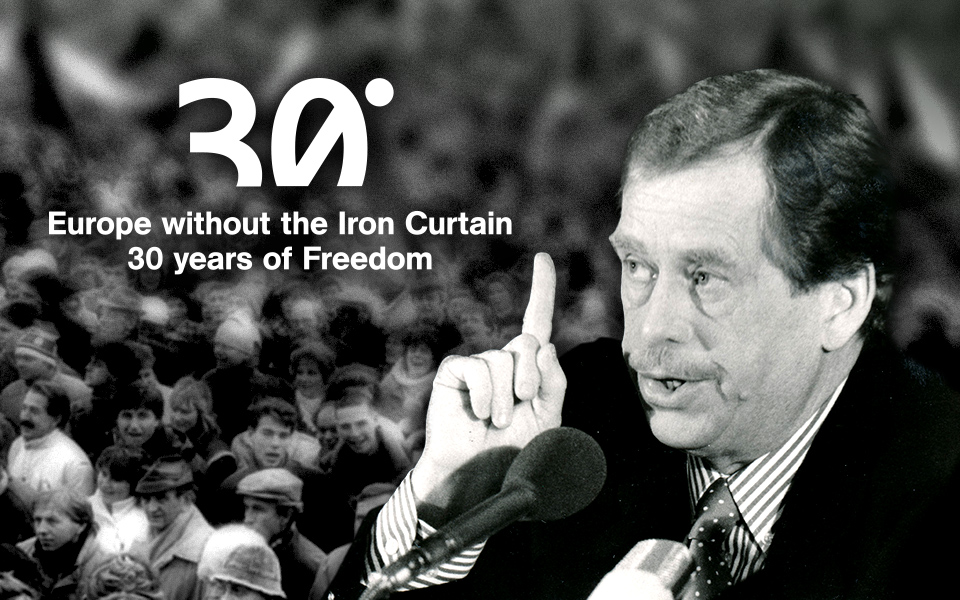Programme
New Building of the National Museum, November 11, 2019
9:30 – 9:45 a.m. Opening speeches
René Zavoral (Director General of Czech Radio) and Michal Lukeš (Director General of the National Museum)
9:45 – 10:00 a.m. Václav Havel and the Velvet Revolution
Michael Žantovský (Executive Director of Václav Havel Library in Prague)
10:00 – 10:15 a.m. Václav Havel, revolutions and 30 years of democracy in Poland
Adam Michnik (editor-in-chief of Gazeta Wyborcza)
10:15 – 10:55 a.m. 1989 – Different revolutions, different stories
Václav Klaus (former President and Prime Minister of the Czech Republic)
Lech Wałęsa (former President of Poland, Nobel Peace Prize laureate)
Magda Vášáryová (former politician and diplomat)
Tamás Deutsch (Member of the European Parliament, co-founder of Fidesz)
Speeches of participants in and historians of the 1989 events:
Development and characteristics of the 1989 revolutions in Poland, Hungary and Czechoslovakia. Why did the Eastern Block, controlled by the Soviet Union, collapse relatively quickly and easily? How did the course of the revolution in each individual country influence its development and social transformation? Have the expectations of the 1989 revolutions been lived up to?
11:00 – 11:30 a.m. Coffee break
11:30 a.m. – 12:45 p.m. 1989 – Different revolutions, different stories
Panel discussion, hosted by Jan Bumba (Czech Radio Plus)
Lech Wałęsa, Magda Vášáryová, Tamás Deutsch, Andrej Zubov
12:45 – 1 p.m. What information on the 1989 revolutions is contained in the Moscow archives?
Michal Macháček (historian, presenting his discoveries after several months of research in Moscow archives)
1 – 2 p.m. Lunch
2–2:15 p.m. Divided by Freedom: Czech society after 30 years
Czech Radio’s research: The state of liberal democracy 30 years after the fall of the Iron Curtain.
Paulína Tabery (Institute of Sociology of the Czech Academy of Sciences)
2:15 – 3:30 p.m. Is democracy in Central Europe in Decline?
Panel discussion, hosted by Michael Rozsypal (Czech Radio Plus)
Ivanka Lefeuvre (former dissident)
Jiří Přibáň (Professor of Law, Cardiff University)
Jacques Rupnik (political scientist, Professor at the College of Europe in Brugges and director of research at Fondation des Sciences Politiques in Paris)
Milan Kňažko (co-founded the Public Against Violence (VPN) movement, advisor to Czechoslovak President Václav Havel, minister of several Slovak governments)
Post-1989 development in Europe. Were the transformations in the 1990s influenced by the course of each individual revolution? How and why was the development in Poland, Czechoslovakia and Hungary different? How were these countries affected by entering the European Union? How does it happen that a country is governed by a one-party government? What is the role of the Visegrad Group? Is liberal democracy in Central Europe in danger?
3:30 – 3:45 p.m Coffee break
3:45 – 5 p.m. Has the Democratic World Missed a Chance in 1989?
Panel discussion, hosted by Michael Rozsypal (Czech Radio Plus)
Yascha Mounk (political scientist, Johns Hopkins University)
Julia Ioffe (journalist, Correspondent at GQ magazine, Lavin Agency speaker)
Alina Mungiu-Pippidi (Professor at Hertie School of Governance, Berlin)
Tomáš Sedláček (economist and philosopher)
Is liberal democracy in danger? How are societies in the USA and in European countries divided? Is it a new phenomenon? Why are authoritarian politicians successful? Why did the golden era of liberal democracy between 1990 and 2010 come to an end? What is the future of the Euro-Atlantic alliance? Does Russia pose a threat? Will NATO survive 2025?
5:00 – 5:20 p.m. Democracy and values of our time – closing speaches
Pavel Rychetský (President of the Constitutional Court of the Czech Republic)
Subject to change without notice

